UPSC GS: Topic-Wise Weightage (2016-2025) | Mock Test for UPSC Prelims 2026 PDF Download
The IAS prelims exam round consists of two papers. The Prelims is essentially an eliminating round in which, from about 5 lakh people (on average) who take the exam, only about 10 – 15 thousand clear it. The marks secured in this exam decide whether aspirants can go on to the next stage or not. It is important to prepare well and have a comprehensive understanding of the subjects covered in this exam.
Here, EduRev experts bring you an analysis of the trends in marks distribution according to various subjects covered in the exam over the past decade.
UPSC Prelims Exam Analysis 2025 [25th May]
The UPSC CSE Prelims is an important exam for those who want to become civil servants. It checks their knowledge, skills, and thinking ability. Knowing how many questions come from each subject helps candidates understand which subjects are more important in the exam.
Topic- Wise Weightage (Paper 1- Prelims 2025)
Here is the topic-wise weightage of the UPSC Prelims Exam 2025. Check the number of questions asked in the UPSC Prelims Paper 1:
- Economy (17 questions): This subject deals with how money, resources, and policies work in the country. It includes topics like budgeting, taxation, and economic development. Understanding the economy helps in knowing how the country grows and manages its finances.
- Environment & Ecology (12 questions): This area focuses on nature, wildlife, pollution, conservation, and climate change. It is important for understanding how human actions affect the planet and what steps can be taken to protect the environment.
- Geography (14 questions): Geography covers the physical features of the Earth such as landforms, rivers, mountains, and climates. It helps in understanding how natural factors influence human life and development.
- History (16 questions): History includes events from the past—ancient, medieval, and modern times. It helps candidates understand how societies evolved and learn lessons from past successes and failures.
- Polity (13 questions): This subject is about the Constitution, government structure, laws, and rights of citizens. It is important for understanding how India is governed and how democratic institutions work.
- Science & Technology (14 questions): This includes developments in science and tech such as space research, biotechnology, and digital advancements. It helps in understanding the role of innovation in modern life.
- Miscellaneous (IR, Society, etc.) (14 questions): This section covers various topics like international relations, social issues, and current affairs. It gives a broad understanding of global and national matters beyond traditional subjects.
These subjects are important as they reflect the different areas of knowledge that a civil servant should be familiar with. To clear the UPSC Prelims, candidates must prepare each of these topics carefully.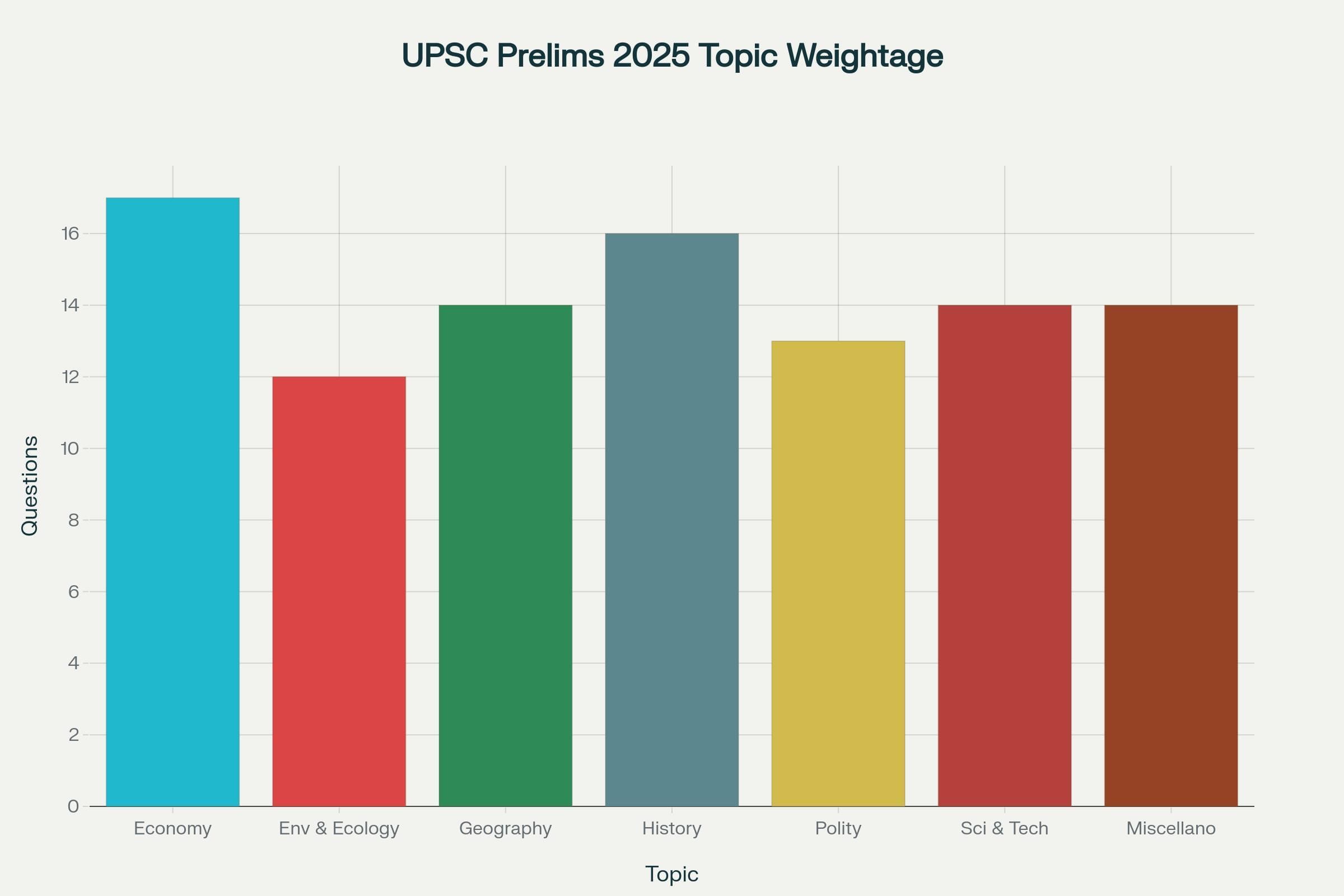
Topic-Wise Weightage (Paper 2 - Prelims 2025)
- Reading Comprehension (29 questions): This section tests your ability to read and understand passages. It includes direct and inference-based questions. Good reading skills and regular practice can help score well in this part.
- Logical Reasoning & Analytical Ability (20 questions): This part checks how well you can think logically and solve problems. It includes puzzles, patterns, statements, and conclusions. Strong reasoning skills are important for this section.
- Maths & Basic Numeracy (31 questions): This section includes questions from basic mathematics like percentages, averages, ratios, and number systems. It tests your calculation speed and understanding of numbers.

All these sections are important to qualify the CSAT paper, which is qualifying in nature but requires consistent practice and clear understanding.
UPSC Prelims Exam Analysis 2024 [16th June]
The UPSC CSE Prelims exam is crucial for those aiming to become civil servants. It tests their knowledge, skills, and thinking abilities. It's essential for candidates to know how many questions come from each subject because it shows which subjects are most important in the exam.
Topic-Wise Weightage (Paper 1 - Prelims 2024)
Here is the topic-wise weightage of the UPSC Prelims Exam 2024. Check the number of questions asked in the UPSC Prelims Paper 1.
- Geography (18 questions): This subject covers topics about the Earth's surface, like countries, mountains, rivers, and climates. It's important for understanding different regions and how they affect people and cultures.
- Environment & Ecology (15 questions): This area focuses on nature and how living things interact with their surroundings. It includes topics like wildlife, forests, pollution, and climate change. Understanding this helps in conserving and protecting our environment.
- Polity (15 questions): This subject deals with how governments work, including laws, rights, and political systems. It's crucial for understanding how countries are governed and the rights of citizens.
- Economy (14 questions): This covers how money and resources are managed in society, including topics like markets, budgets, and economic growth. It's important for understanding how societies grow and manage their wealth.
- Science & Technology (13 questions): This includes advancements in scientific research and technology, like computers, space exploration, and new inventions. It's important for understanding how technology changes our lives and the world around us.
- Miscellaneous (IR, Society, etc) (13 questions): This category includes topics like international relations (IR), society, and other current affairs. It covers a range of issues that impact societies globally.
- History (12 questions): This subject covers events from the past, including ancient civilizations, revolutions, and important figures. Understanding history helps us learn from the past and understand how societies have developed over time.
These subjects are important because they cover different aspects of human society, from its past and present to its environment and governance. Candidates preparing for the UPSC CSE Prelims need to be familiar with all these areas to succeed in the exam.
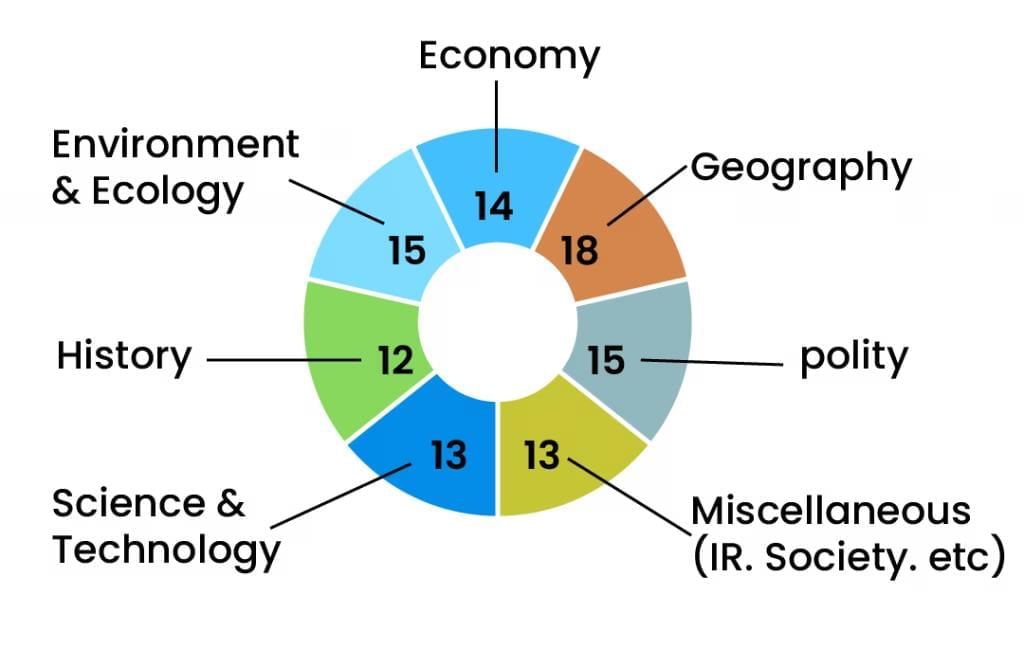
Topic-Wise Weightage (Paper 2 - Prelims 2024)
- Maths (38 questions): This section includes topics like percentages, averages, ratios, number systems, time and work, and data interpretation. It checks your numerical ability and problem-solving skills. Regular practice is essential to manage time and accuracy.
- English (27 questions): This part mainly tests reading comprehension. Passages are given followed by questions that test your understanding, vocabulary, and ability to draw conclusions. Good reading habits and comprehension skills help in scoring well here.
- Reasoning (15 questions): This section includes logical and analytical reasoning questions such as patterns, puzzles, coding-decoding, and statement-conclusion. It tests your thinking ability and how quickly you can solve problems.
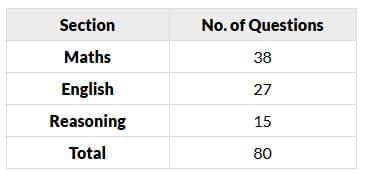
All three sections are important to clear the CSAT paper, which is qualifying in nature but requires a balanced approach and regular revision.
UPSC Prelims Exam Analysis 2023 [28th May]
The UPSC CSE Prelims examination is a significant milestone for individuals aspiring to become civil servants, assessing their understanding, aptitude, and analytical abilities. It is important for candidates to be familiar with the distribution of questions across different subjects, as it determines the majority of the questions that will be asked. The following outlines the weightage of questions for each subject.
Topic-Wise Weightage (Paper 1 - Prelims 2023)
You can refer to the table below, which presents the distribution of questions based on topics in the UPSC Prelims Exam 2023 Paper I for all posts.
Here is the topic-wise weightage of the UPSC Prelims Exam 2023. Check the number of questions asked in the UPSC Prelims Paper 1.
- Polity: In the GS Paper 1 of UPSC Prelims 2022, Polity had 15 questions influenced by current affairs. Covering topics such as presidential elections, Money Bills, Due process of law, and emergency provisions. A few purely factual questions were asked.
- Economy: The Economy section had 16 questions. The majority of the questions in the Indian economy section are from banking, and the type of questions are very straightforward.
- Science: The Science section had 12questions mostly influenced by Current Affairs in Science and Technology.
- History: There were 14 questions in total from Ancient, Medieval, Modern, and Art and Culture with a blend of easy, moderate, and tough levels of questions.
- Geography: The Geography section had 16 questions on Geography some being technical while some were geographical location-based. Overall the level had been moderate for aspirants who prepared for Geography.
- Environment: The Environment section had 14 questions covering both Current Affairs oriented questions as well as conceptual questions.
- International Relations & Miscellaneous – There were 11 questions from International Relations. UPSC has given high priority to International Relations this year as well. There were a lot of map-based questions, important treaties, conventions, and questions on agreements involving India.
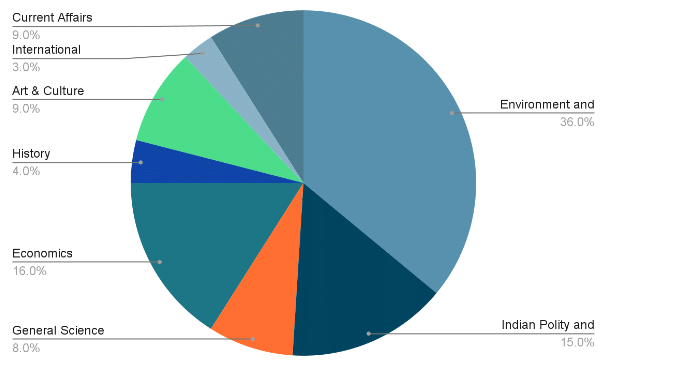
Topic-Wise Weightage (Paper 2 - Prelims 2023)

UPSC Prelims Exam Analysis 2022 [05th June]
The GS Paper 1 was held between 09:30 AM-11:30 AM and includes 100 questions in total. Whereas, the GS Paper 2 (CSAT) is conducted from 02:30 PM - 04:30 PM and comprised 80 questions. Both the papers have negative markings. As per the UPSC Prelims Analysis, the overall level of the UPSC IAS Prelims questions paper was mixed as aspirants found economics questions to be tough while polity had direct questions.
Topic-Wise Weightage (Paper 1 - Prelims 2022)
Here is the topic-wise weightage of the UPSC Prelims Exam 2022. Check the number of questions asked in the UPSC Prelims Paper 1.
- Polity: In the GS Paper 1 of UPSC Prelims 2022, Polity had 13 questions influenced by current affairs. The questions covered various topics of Preamble and Governance.
- Economy: The Economy section had 17 questions on Gold Tranche, FDI, TRIMS that were direct or conceptual. The questions on the monetary policy of RBI, the role of cooperative banks were wholly easy to moderate.
- Science: The Science section had 14 questions mostly influenced by Current Affairs in Science and Technology. There was only 1 question on General Science
- History and Geography: There were 24 questions in total. There were 20 questions in the History section, from Ancient, Medieval, Modern, and Culture with a blend of easy, moderate, and tough levels of questions. The Geography section had 13 questions on Geography and Agriculture some being technical as of types of soil, climate, and fertilizer of crops while others are geographical location-based. Overall the level had been moderate for aspirants who prepared for Geography.
- Environment: The Environment section has become a staple for UPSC exams that had 17 questions plainly based on Current Affairs, pollutants, National Parks and Bio Fuels. Candidates with memorizing power and logical reasoning abilities can wildly guess to earn a few points.
- Current Affairs: Current Affairs section is where UPSC saves its surprises for the aspirants. However, this year, there were only 09 questions from Current affairs, along with 1 from Miscellaneous. Government Schemes like Kisan Credit Card and animal cells and vaccines as influenced by COVID.
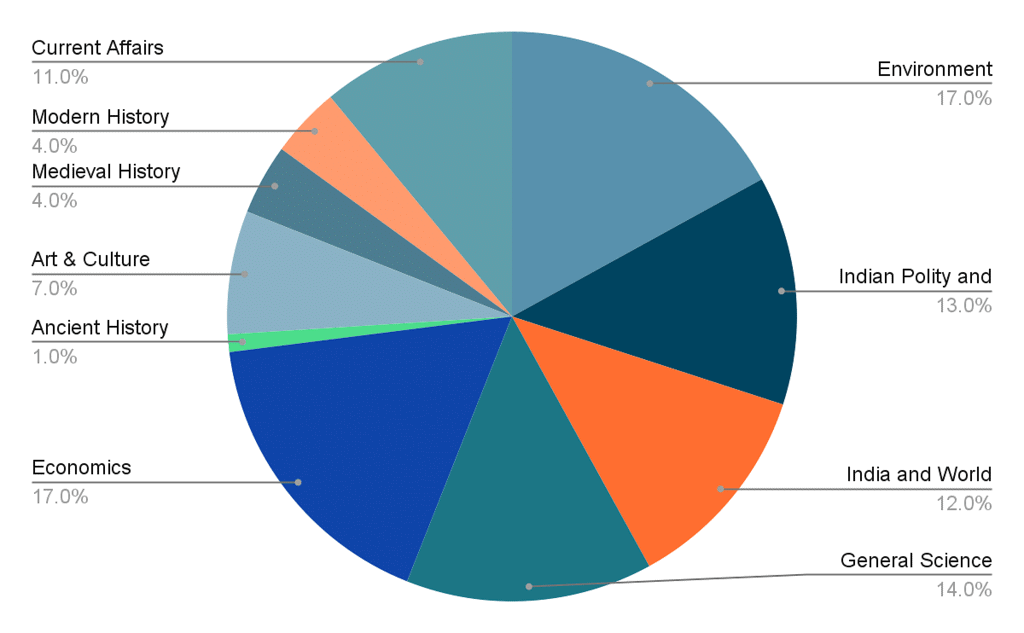
Topic-Wise Weightage (Paper 2 - Prelims 2022)
The UPSC Prelims 2022 Paper 2 (CSAT) comprised 80 Questions, each carrying 2.5 marks with a total of 200 marks.

Topic-Wise Weightage (Paper 1 - Prelims 2021)
- Polity: In the GS Paper 1 of UPSC Prelims 2021, Polity had 14 questions influenced by current affairs. The questions covered various topics of Preamble and Governance.
- Economy: The Economy section had 15 questions on Gold Tranche, FDI, TRIMS that were direct or conceptual. The questions on the monetary policy of RBI, the role of cooperative banks were wholly easy to moderate.
- Science: The Science section had 13 questions mostly influenced by Current Affairs in Science and Technology. There was only 1 question on General Science.
- History and Geography: There were 33 questions in total. There were 20 questions in the History section, from Ancient, Medieval, Modern, and Culture with a blend of easy, moderate, and tough levels of questions. The Geography section had 13 questions on Geography and Agriculture some being technical as of types of soil, climate, and fertilizer of crops while others are geographical location-based. Overall the level had been moderate for aspirants who prepared for Geography.
- Environment: The Environment section has become a staple for UPSC exams that had 17 questions plainly based on Current Affairs, pollutants, National Parks and Bio Fuels. Candidates with memorizing power and logical reasoning abilities can wildly guess to earn a few points.
- Current Affairs: Current Affairs section is where UPSC saves its surprises for the aspirants. However, this year, there were only 07 questions from Current affairs, along with 1 from Miscellaneous. Government Schemes like Kisan Credit Card and animal cells and vaccines as influenced by COVID.
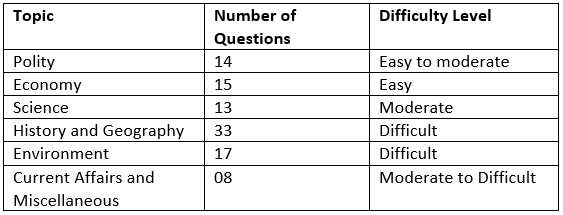
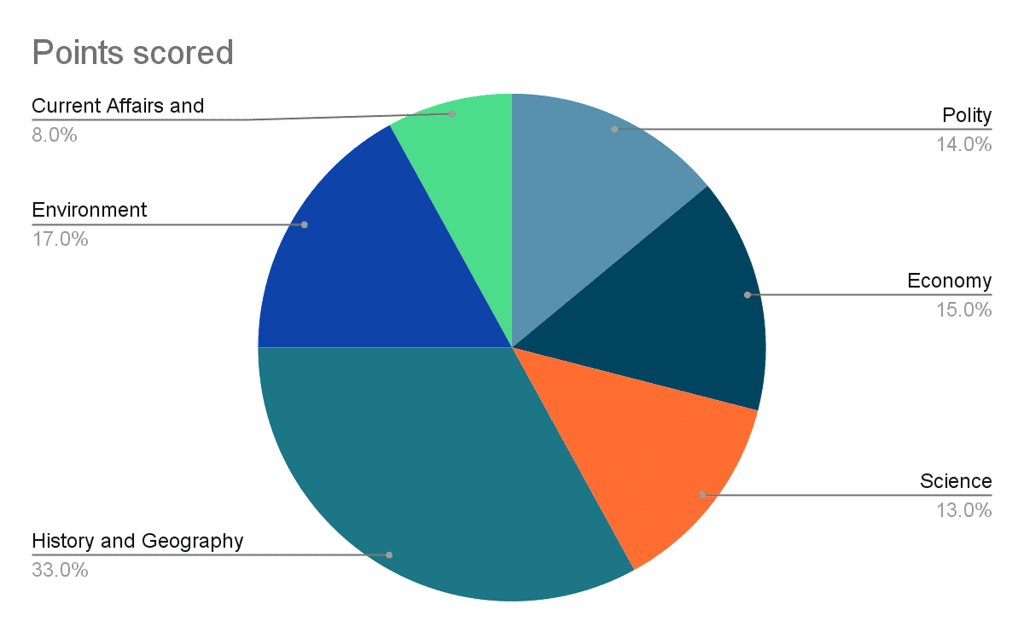
Topic-Wise Weightage (Paper 2 - Prelims 2021)
The UPSC Prelims 2021 Paper 2 (CSAT) comprised 80 Questions, each carrying 2.5 marks with a total of 200 marks
| Topic | Number of Questions Asked |
| Reading Comprehension | 27 |
| Basic Numeracy | 33 |
| Data Interpretation and Data Sufficiency | 2 |
| Reasoning | 18 |
Topic-Wise Weightage (Paper 1 - Prelims 2020)
Polity: The GS Paper 1 of UPSC Prelims 2020, maximum questions were from Polity which is about 16 questions influenced by current affairs. The questions covered areas of Preamble, Fundamental Rights, DPSP, Basic Structure, Union Government.
- With the entire paper focusing on conceptuality, there were questions from MPLAD, Parliament sessions, and interestingly from Parliamentary Democracy, Gandhism, Constitutional Government, Marxism as well. Overall. the difficulty level; of Polity ranged from easy to moderate.
- Economy: The economy section had 14 questions on Gold Tranche, FDI, TRIMS that were direct or conceptual. The questions on the monetary policy of RBI, the role of cooperative banks were wholly easy to moderate.
- Science: The science section had 10 questions mostly influenced by Current Affairs in Science and Technology in areas of Artificial Intelligence, Blockchain Technology, Nanotubes. Questions were easy if aspirants managed to keep track of Tech-based questions while preparing.
- History and Geography: There had been 18 questions in History, from Ancient, Medieval, and Culture with a blend of easy, moderate, and tough levels of questions. The geography section had 10 questions on Geography and Agriculture some being technical as of types of soil, climate, and fertilizer of crops while others are geographical location-based. Overall the level had been moderate for aspirants who prepared for Geography.
- Environment: The environment section has become a staple for UPSC exams that had 17 questions plainly based on Current Affairs, pollutants, National Parks and Bio Fuels. Candidates with memorizing power and logical reasoning abilities can wildly guess to earn a few points.
- Current Affairs: Current Affairs section is where UPSC saves its surprises for the aspirants. This year, there were 15 questions from Current affairs, Government Schemes like Kisan Credit Card, and animal cells and vaccines as influenced by COVID.
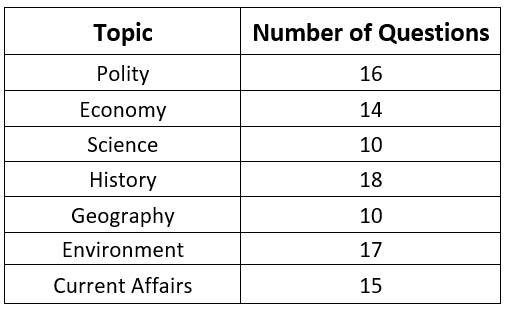
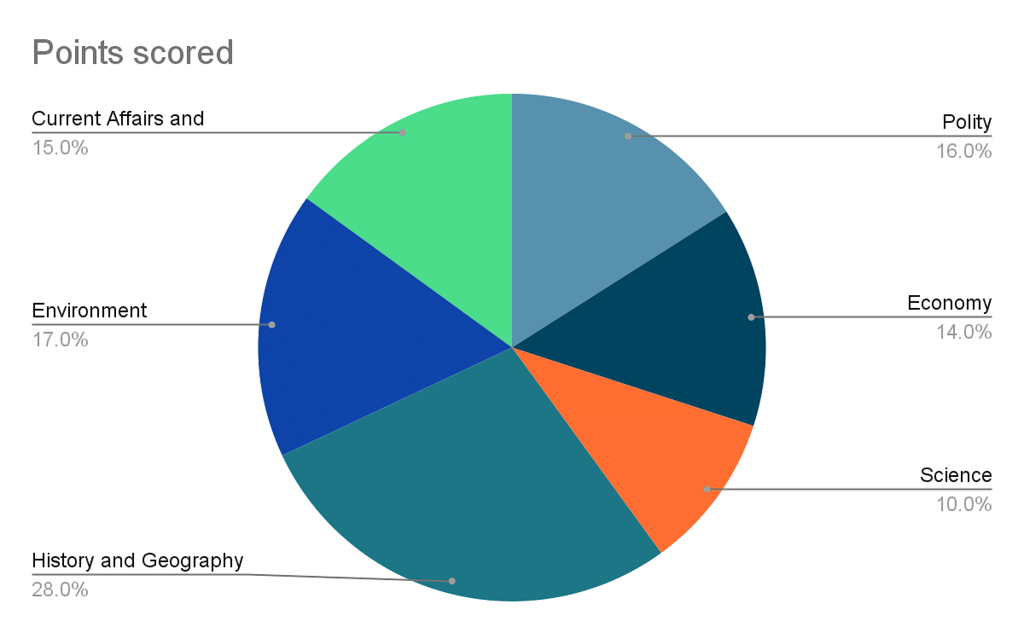
Topic-Wise Weightage (Paper 2 - Prelims 2020)
The UPSC Prelims 2020 Paper 2 (CSAT) comprised 80 Questions, each carrying 2.5 marks with a total of 200 marks.
| Topic | Number of Questions being asked |
| Reading Comprehension | 25 |
| Basic Numeracy | 39 |
| Data Interpretation | 6 |
| Reasoning | 10 |
Topic-Wise Weightage (Paper 1 - Prelims 2019)
History: Almost all the questions were asked from Medieval and Modern India. Some of the questions in Modern India are from the Swadeshi Movement and Charter Act of 1813.
- Geography: The questions were asked on crop production, summer solstice June 21 and glacier. Environment - Biosphere reserve, endangered species, Ramsar Convention, pollution, etc.
- Economy: Ease of doing business, purchasing power parity, AIIB, Union Budget, etc.
- Indian Polity: Article 142, the office of profit, Governor, fifth and ninth schedule, etc. Science Technology - LTE & VOLTE, digital signature, RNA interface technology, etc.
- Current Affairs: Around three questions were asked regarding international relations. Some questions on agreements and trending topics.
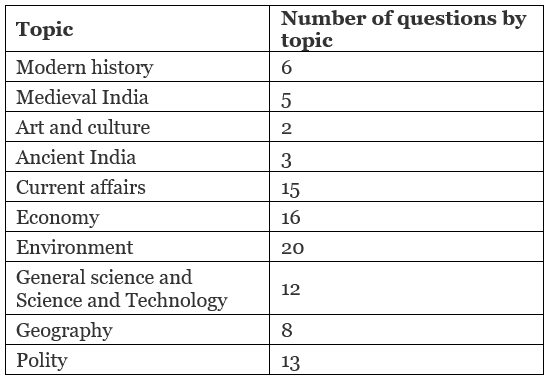
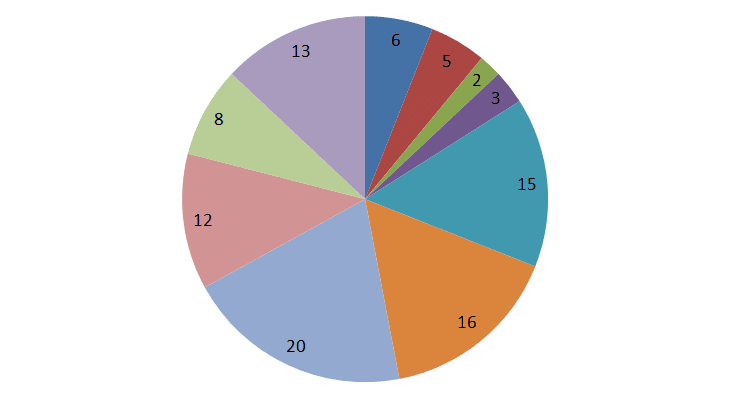
Topic-Wise Weightage (Paper 2 - Prelims 2019)
The UPSC Prelims 2019 Paper 2 (CSAT) comprised 80 Questions, each carrying 2.5 marks with a total of 200 marks.
| Topic | Number of Questions being asked |
| Reading Comprehension | 30 |
| Basic Numeracy | 26 |
| Data Interpretation | 10 |
| Reasoning | 14 |
Topic-Wise Weightage (Paper 1 - Prelims 2018)
Polity: The major chunk of questions came from the Polity section. The majority of the questions asked were concept-based, but the root of the questions was current affairs. So the nature of polity questions was current affairs-based conceptual questions.
Example - Money Bill, BPL, Right to Education, Aadhar Card, FRBM and so on.
- Economy: The next major chunk of the question asked in this year's Prelims exam was from the Economy section. This section saw a mix of both conceptual-based and current affairs-based questions. Someone with good command over the economy subject would have been able to answer questions with less effort since most of the questions asked from this section were of moderate difficulty.
- Geography: In this year s Geography section, UPSC asked more map-based and factual questions. Usually, UPSC asks conceptual-based questions from the Geography section, but this year it changed the trend drastically.
- Environment: Questions from the Environment section were asked based on current affairs. Almost all questions from this section were from the last 1-2 year current affairs issues. For example - conservation agriculture, Sixth Mass Extinction, GM mustard, carbon fertilization, prosopis juliflora, etc.
- Science and Tech: Almost all questions asked from S and T section this year were based on current issues and burning topics. Most of the questions asked in this section were on expected lines, for example, questions like the Internet of Things, 3D printing, the theory of relativity, IRNSS etc.
- History: In the 2018 Prelims question paper, the number of questions asked from the history section was comparatively higher when compared to previous years' papers. Most of the questions asked in this section were factual in nature and few questions were difficult to answer, for example, actions taken by the British after the Santhal Rebellion.
- Art and Culture: Questions from Art and Culture section were less and the questions were simple in nature, but finding the correct answer has made this section difficult since the questions are fact-based, like GI Tags, cultural history questions, etc.
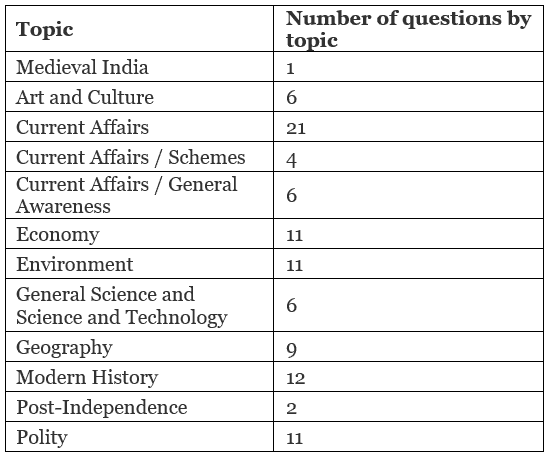
Topic-Wise Weightage (Paper 2 - Prelims 2018)
The UPSC Prelims 2018 Paper 2 (CSAT) comprised 80 Questions, each carrying 2.5 marks with a total of 200 marks.
Topic | Number of questions being asked |
Reading Comprehension | 26 |
Basic Numeracy | 17 |
Data Interpretation | 12 |
Reasoning | 25 |
Topic-Wise Weightage (Paper 1 - Prelims 2017)
Prelims 2017 was considered to be the toughest exam in the last five years. The expected cutoff is to be lower than that of last year because of the analytical nature of questions and based on current affairs. Here is the Subject Wise Analysis of UPSC Prelims 2017.
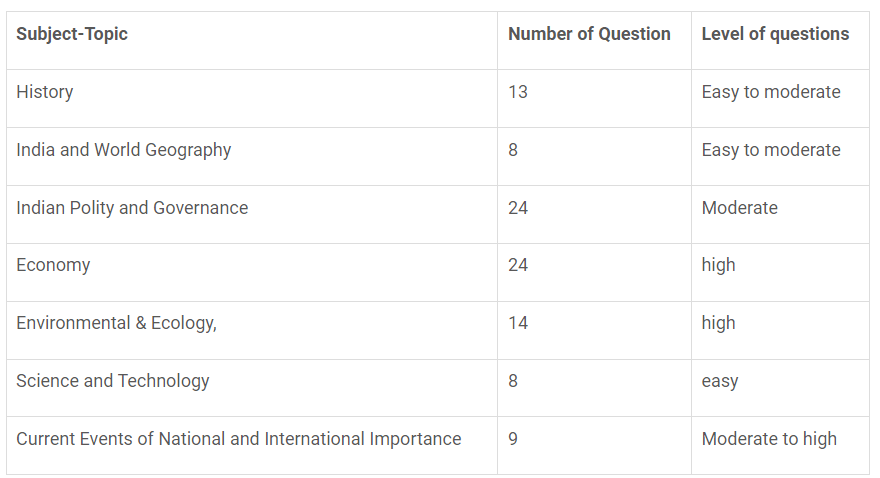
Topic-Wise Weightage (Paper 2 - Prelims 2017)
The UPSC Prelims 2017 Paper 2 (CSAT) comprised 80 Questions, each carrying 2.5 marks with a total of 200 marks.
Topic | Number of questions being asked |
Reading Comprehension | 30 |
Basic Numeracy | 24 |
Data Interpretation | 0 |
Reasoning | 26 |
Topic-Wise Weightage (Paper 1 - Prelims 2016)
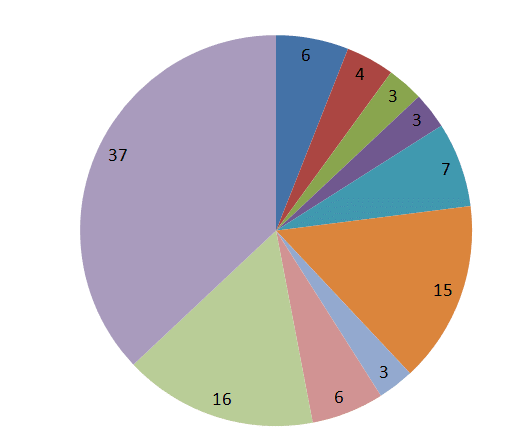

Topic-Wise Weightage (Paper 2 - Prelims 2016)
Topic | Number of questions being asked |
Reading Comprehension | 27 |
Basic Numeracy | 28 |
Data Interpretation | 0 |
Reasoning | 25 |
UPSC Official Prelims Cut-off of Last Five Years
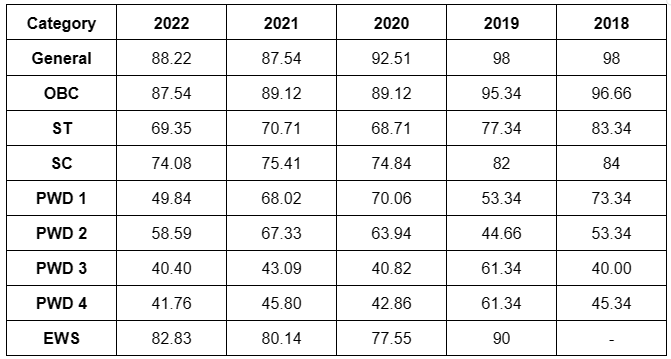
Now that you are aware of the level of difficulty and topic-wise distribution of UPSC Papers, EduRev provides you with comprehensive and up-to-date IAS Exam 2023 preparation material. Access a wealth of free study materials and stay on top of the latest current affairs, all in one convenient place. Start your journey to success with us today.
|
16 videos|6 docs|50 tests
|
FAQs on UPSC GS: Topic-Wise Weightage (2016-2025) - Mock Test for UPSC Prelims 2026
| 1. What is the significance of topic-wise weightage analysis in UPSC Prelims exam preparation? |  |
| 2. How can UPSC Prelims exam analysis help aspirants in their preparation strategy? |  |
| 3. What is the importance of understanding the topic-wise weightage of Paper 1 and Paper 2 in UPSC Prelims exam? |  |
| 4. How can aspirants use the topic-wise weightage data from previous years in their UPSC Prelims exam preparation? |  |
| 5. Are there any specific strategies that aspirants can adopt based on the topic-wise weightage analysis for UPSC Prelims exam? |  |






















